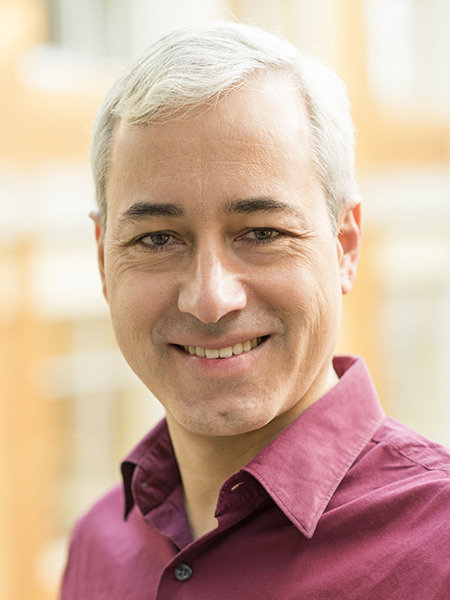Allen School professor Pedro Domingos has been selected as the 2019 recipient of the John McCarthy Award from the International Joint Conference on Artificial Intelligence (IJCAI). The award, which is named for one of the founders of the field of AI, recognizes established, mid-career researchers who have amassed a track record of significant research contributions that have been influential in advancing the field. Domingos is being honored by the IJCAI for his multiple contributions in machine learning and data science and for advancements in unifying logic and probability.
Domingos focuses on ways to enable computers to discover new knowledge, learn from experience, and extract meaning from data with little or no help from people. A prolific researcher and speaker on the topics of AI, machine learning, and data mining, he has authored more than 200 technical papers on these and other subjects. In 2015, Domingos published The Master Algorithm: How the Quest for the Ultimate Learning Machine Will Remake Our World, a book intended for a broad audience that explores in a comprehensive yet accessible way how developments in machine learning impact on people’s everyday lives and the potential — and potential pitfalls — of living in the “age of algorithms.”
Domingos himself is partly responsible for ushering in this exciting new era through a series of research projects that represents the state of the art. For example, he and former student Abe Friesen (Ph.D., ‘17) developed a new algorithm, known as Recursive Decomposition into locally Independent Subspaces (RDIS), that outperformed existing techniques for solving a broad class of nonconvex optimization problems. Their work, which earned the duo a Distinguished Paper Award at IJCAI-15, can be applied in a variety of domains, including computer vision, machine learning, and robotics. That same year, Domingos received the SIGKDD Test of Time Award, along with his collaborator and Allen School alumnus Geoff Hulten (Ph.D., ‘05), from the Association for Computing Machinery’s Special Interest Group on Knowledge Discovery and Data Mining for the Very Fast Decision Tree learner (VFDT), an algorithm for mining high-speed data streams. Originally published in 2000, the VFDT algorithm remained the fastest decision tree learner available 15 years after its release. Domingos and Hulten later expanded the VFDT algorithm into the Very Fast Machine Learning (VFML) toolkit for mining high-speed data streams and vast data sets.
In 2014, Domingos earned the SIGKDD Innovation Award — the highest award for technical excellence in the field of data mining and data science — for foundational contributions to data stream analysis, cost-sensitive classification, adversarial learning, Markov logic networks, and viral marketing and information integration. Among his early-career achievements recognized by SIGKDD were MetaCost, a novel method for cost-sensitive classification that can be applied to a wide array of data mining problems. MetaCost, which earned a Best Paper Award for Fundamental Research when it was released, offered an improvement over existing practices such as stratification or making individual algorithms cost-sensitive. In another contribution that also earned a Best Paper Award for Fundamental Research, Domingos explored Occam’s razor as it is applied to data mining and effectively dismisses one accepted interpretation — that simplicity leads to greater accuracy — while building a case for a refined alternative to simplicity as a goal in itself. In his refined interpretation, Domingos presents an argument for decoupling discovery of the most accurate model from the extraction of the most comprehensible approximation of it.
Domingos’ other pioneering contributions to the field include the first algorithm for solving the problem of adversarial classification — which spurred the growth of adversarial learning as a significant branch of machine learning research and practice — with then-students Nilesh Dalvi, Mausam, Sumit Sanghai, and Deepak Verma. Working with another former student, Hoifung Poon (Ph.D., ‘11), Domingos employed Markov logic to also produce the first unsupervised approach to semantic parsing for natural language processing.
Domingos will be formally recognized with the John McCarthy Award at IJCAI-19 in Macao, China next month.
Congratulations, Pedro!


